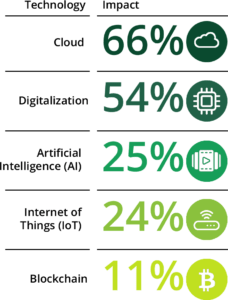
The future of Project Management in IT & Consulting: Managing Projects in Industry 4.0
“In Industry 4.0, Project Management is not only about managing the projects efficiently but also about driving productivity, excellence, and resilience among the stakeholders across the entire value chain of project management”.
Managing IT & Consulting projects remains an integral part of tech organizations, and that’s imperative as well, with these companies’ delivering projects to their clients and running their businesses.
The issue with project management these days is the difficulty organizations face in managing multiple projects strategically and delivering hassle-free projects, which leads to less client retention and poor project delivery, and that’s where digital project management comes to play, which utilizes digital tools and technologies to track, monitor and manage projects and enhance the organizations’ productivity.
The evolution of project management has been an enriching journey that has become even more dramatic in the post-pandemic world, where digital transformation has become the new normal.
Companies across sectors utilize several ways to carry out their business functions. Then how come project management needs to be included, which forms companies’ core and sets the tone for their businesses.
Digital Transformation and Project Management
Project Management, especially in the IT & Consulting industry, plays a vital role in the success of organizations.
Nothing is denying the fact that digital is serving project management as well, with organizations leveraging on not just tracking a project and reporting updates but also driving an organization’s results engine acting as a critical connector between strategy and execution that ensures the suitable projects are affected in the right way, with the right people, at the right time.
Project Management Office and Project Management
Project Management Office, often regarded as PMO, has attained a massive disruption in the performance of their projects since the time they included digital project management as their critical element.
According to Project management Institute, PMI research, more than 55 percent of PMO directors say the project mode of their PMO has changed in the past five years owing to a surge in digital transformation across the industries, making digital project management occupying the driver’s seat.
In one of its reports, Deloitte also suggests that the rise in digital transformation has led to the disruption of emerging technologies such as AI, Blockchain, Cloud, and IoT, dramatically impacting how projects are managed.
Let’s look at the figures below depicting the impact emerging technologies have on Project management.

Figure 1. Impact of emerging technologies on Project Management.
However, factors such as project tracking, coordinating, governance, and planning remain some of the major hindrances to digital project management, which can be addressed with the below-mentioned approach.
1.Managing Project Tracking
Project tracking becomes smoother when project leaders follow agile project management by delivering project management in terms of “story points” and monitoring the performance and the progress of working software.
2.Tackling Project Coordination
Project Coordination in digital project management differs slightly from managing projects traditionally.
An agile approach to tackling project coordination orchestrates the work planning process, facilitating coordination among agile delivery teams and enhancing the overall project management process.
3.Ensuring Project Governance
Governance forms a crucial aspect of any project management process.
Agile project management that follows project governance replaces the traditional phase-gate governance reviews, allowing teams to rapidly release functionality without requiring formal approval, ensuring a smooth project management process.
4.Streamlining the “Annual Planning” process
Organizations utilize the annual planning process for their project management-related tasks.
Managing projects digitally leverages agile strategy, goals, and targets to be adjusted regularly, and corrective measures to streamline the digital project management process get in place.
Moreover, business leaders have repeatedly talked about project management and its role in reshaping industries unimaginably and adding value to their businesses, enabling them to make real-time decisions.
“Operations keeps the lights on, strategy provides a light at the end of the tunnel, but project management is the train engine that moves the organization forward.”- Joy Gumz, Director of Project Auditors, LLC.
The above quote from one of the famous business leaders sheds light on the significance of project management and how it contributes to an organization’s growth and drives value from digitization.
Furthermore, project management software such as Scoro, ProofHub, Basecamp, Asana, and Citrix Podio lets business leaders manage their projects from project commencement to project delivery stages across the entire value chain of project management., thereby helping organizations gain actionable insights and achieve growth with project management.
A recent study from Kissflow suggests that 77% of high-performing teams across organizations use project management software, which exacerbates the importance of having project management software which remains a vital element of digital project management.
Market share of leading Project Management software.

Conclusion
Digital transformation is the new normal, and just like any other business function across the sectors, it goes true for project management.
Companies in several businesses deal with multiple projects at any given time. Hence, it becomes tedious for them to drive project management effectively, and that’s where project management software eases their tasks and delivers digital growth to organizations.
Digital project management is adding massive value to organizations and looks more promising in the upcoming days delivering digital value to organizations and their clients.





